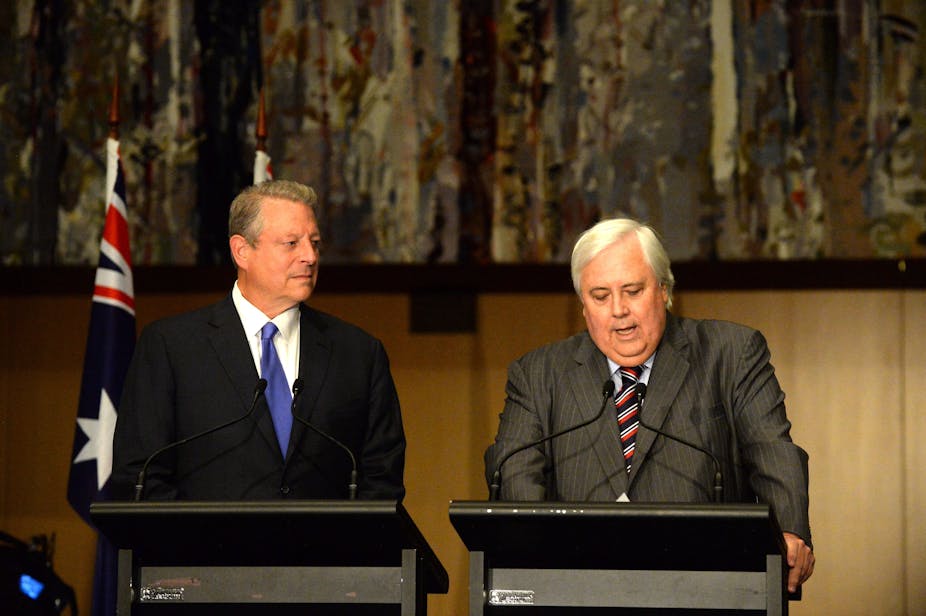In a spectacular joint appearance with former Vice President Al Gore, Clive Palmer has announced PUP will vote to repeal the carbon tax but seek to set up a shell emissions trading scheme that could be activated in the future.
The PUP senators, who take their places from July 1, will also vote against the abolition of the Clean Energy Finance Corporation and the Climate Change Authority, and prevent any change to the renewable energy target before the next election.
The Palmer Party’s decision means that Tony Abbott will be able to fulfil his promise of scrapping the carbon tax but can only get part of the measures in his broad repeal package.
PUP will demand that the repeal legislation contain a provision to ensure that all energy producers have to pass on to consumers the savings from the end of the tax. The government maintains that the Australian Competition and Consumer Commission will make sure that savings are passed on and no additional measure is needed in the legislation.
Palmer staged his press conference in Parliament House’s Great Hall. He and Gore gave addresses and then immediately left without taking questions. Palmer said he would meet the media again later in the evening, after dinner.
Gore, an international campaigner on climate issues, said that while he would be disappointed if the immediate price on carbon was removed, “I am extremely hopeful that Australia will continue to play a global leadership role on this most pressing issue”.
Palmer’s plan would seek to insert an amendment into the Climate Change Authority legislation for the establishment of an emissions trading scheme that would only become effective once Australia’s main trading partners also took action to establish such a scheme.
“This is designed to establish and encourage a fair global scheme quickly,” he said.
So the measure could not be defined as a financial one, the scheme would have a carbon price zero rated, he said.
“The government and the parliament of the day have the ability to set the financial parameters of the scheme based on the action of our leading trading partners such as China, the United States, the European Union, Japan and Korea. We need to ensure the jobs and enterprises of all Australians will not be disadvantaged. Australia will respond in like terms.”
Gore said this was an “extraordinary moment in which Australia, the US and the rest of the world is finally beginning to confront the climate crisis in a meaningful way”. He pointed to recent actions by US President Barack Obama; cap and trade systems in two provinces and five cities in China with an indication these pilots would serve as the basis for a future national system; and positive developments in India.
“All of these developments add up to the world moving to solve the climate crisis and that is why it is so significant that Clive Palmer has announced that his party will support the continuation of the renewable energy target and the continuation of the Clean Energy Finance Corporation and the continuation of the Climate Change Authority, and that he has announced as well that he and his party will fight to implement an ETS under the conditions he has described.”
Palmer said that while in opposition the Abbott-led Coalition had promised before the election that Australia would retain its renewable energy target. “Now he seeks to break this promise. We will therefore not support any change to the RET before 2016.”
Palmer said that he had talks with Gore, “a great leader” who had “certainly convinced me of the need for the whole world to work together”.
“The world is constantly changing and our ability to adapt to change and keep an open mind on issues that effect all of us is what really matter.” Palmer said Obama “has recently shown great leadership on the issue.”

